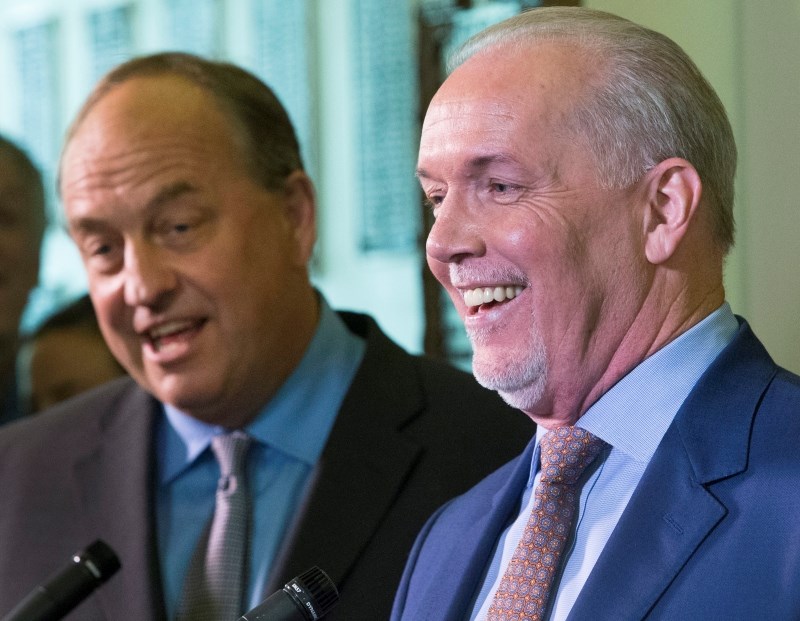 The Green Party team had one last meeting on Sunday night with the B.C. Liberals about a potential arrangement to keep them in power. It went from dinner until about 11 p.m. Like the earlier rounds of talks, they were cordial and positive. There was a sense that there was momentum building toward some kind of arrangement with the Liberals.
The Green Party team had one last meeting on Sunday night with the B.C. Liberals about a potential arrangement to keep them in power. It went from dinner until about 11 p.m. Like the earlier rounds of talks, they were cordial and positive. There was a sense that there was momentum building toward some kind of arrangement with the Liberals.
It was based on a few key concessions and also on simple arithmetic. Liberals indicated they were ready to move quickly on campaign finance reform, after making some grudging moves before the campaign.
They were ready to conduct a referendum on the proportional representation voting system that the Greens promised during the campaign, and demanded after the minority situation developed. And they were talking about there being some room in the budget for some of the spending on the Greens’ shopping list.
What made the Liberal propositions slightly more attractive was the seat count.
Forty-three Liberals and three Greens equals 46, which is a majority that would be likely to last longer than the 44 seats represented by any NDP-Green arrangement.
But at the end of the long night, the Greens recoiled at the prospect. Leader Andrew Weaver took stock of the numerous sessions his side held with the Liberals and the NDP, and decided late Sunday he was throwing his lot in with the NDP.
He notified NDP Leader John Horgan Monday morning, which Horgan noted “put a spring in my step.”
The Greens also notified the Liberals Monday morning that they’d lost the bidding war. It’s a nice historical touch that the man they talked to was Brad Bennett, who represented the premier at the negotiating table throughout.
Bennett’s grandfather, W.A.C. Bennett, conducted an intense round of similar negotiations 65 years ago. The B.C. Social Credit League came out one seat ahead in an inconclusive election and W.A.C. parlayed the support of a lone Labour MLA (Fernie’s Tom Uphill) into an agreement with the lieutenant governor to let him take power. He stayed there for 20 years.
You win some, you lose some.
In the rush of events, Clark tried to call Weaver after learning of his decision. She had to leave voicemail. Weaver said at his announcement he hadn’t listened to it yet.
The Greens’ “framework” for an arrangement on control of the legislature was presented to both other parties during the talks. After the decision was made, the multi-page document was re-christened as a “Confidence and Supply Agreement” between the Greens and the NDP.
It is to be signed by both caucuses Tuesday. It will serve as proof positive to Lt.-Gov. Judith Guichon that the NDP can command the confidence of the legislature. Barring some last-ditch manoeuvre by the desperate Liberals, it should be enough to make Horgan premier.
The Liberals are two seats ahead of the NDP, and only one seat short of a majority. But Clark was miles behind Horgan when it came to the support she needed the most — the three-member Green caucus.
The Liberal concessions made for an attractive package. But it was Clark’s conduct and record that likely proved to be the stopper. Even while trying to stay non-committal during briefings on the talks, Weaver couldn’t resist taking shots at her. He said she erred on one interpretation, and was reckless in her policies.
When asked Monday about her references to the job-killing NDP and Green plans during the campaign, Weaver again teed off on her. “Frankly with respect, she’s been getting away with that rhetoric for far too long.”
B.C. didn’t get the 100,000 new jobs she promised, the trillion dollars in growth, or the elimination of debt.
“She says a lot of things, and they don’t actually transpire.”
Just So You Know: Weaver and Horgan sat together at the Rugby Sevens tournament on Sunday and there was enough of a jock bond to produce this comment after the agreement was announced. Weaver said one of the first things he’ll be “knocking on John’s door about,” is the idea of Victoria bidding for the 2022 Commonwealth Games.
That is an idea from the Liberals’ Island platform.



